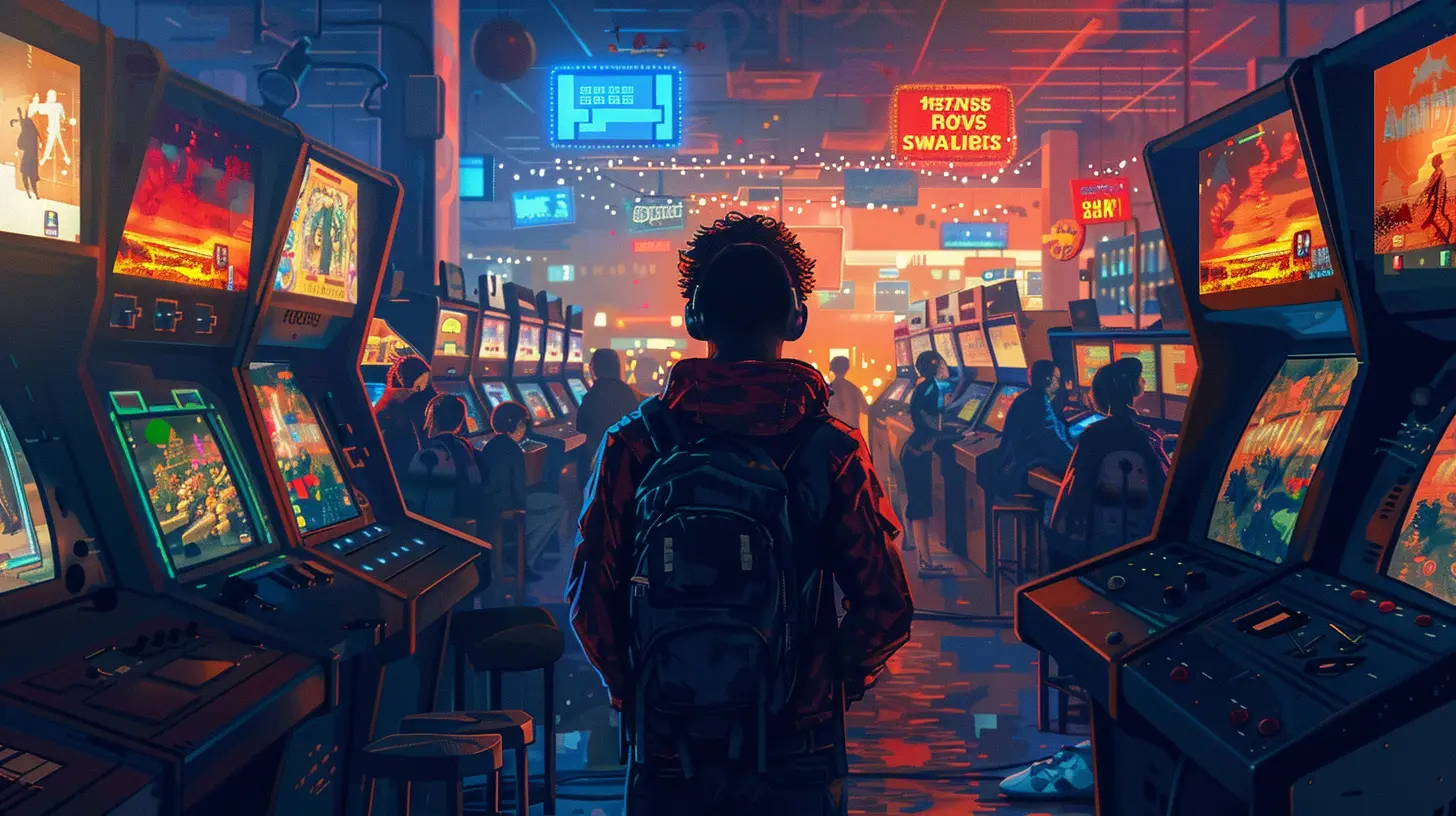How Casual Games Keep Us Coming Back for Just One More Round
24 June 2025
Let’s be honest—how many times have you told yourself, “Just one more round” while playing a casual game? Maybe you were trying to beat your high score on Candy Crush, stack those perfect tiles in 2048, or hold onto your streak in Wordle. And yet, one more round somehow turns into five…then ten. Before you know it, an hour has flown by!
So, what is it about casual games that hooks us? Why do we keep coming back? In this article, we’ll break down the psychology, design tricks, and addictive simplicity of these games that make them impossible to resist. Don’t worry—you’re not the only one trapped in the loop!
What Are Casual Games, Anyway?
First off, let's define what we're talking about. Casual games are those simple, easy-to-pick-up-and-play games that don’t require much time, skill, or commitment. They’re perfect for killing a few minutes while waiting in line, riding the subway, or procrastinating at work. Think mobile games like Candy Crush, Angry Birds, Subway Surfers, or even a quick Sudoku puzzle.These aren’t the sprawling, 100-hour adventures like Elden Ring or The Witcher 3. Casual games are more like the snacks of the gaming world—quick, satisfying, and dangerously addictive.
The Secret Sauce: Why They're So Addictive
So, what’s the secret? Why do casual games have such a strong hold on us? A lot of it comes down to smart design and a deep understanding of human psychology. Let’s break it down:1. Quick, Bite-Sized Gameplay
Casual games are perfect for short bursts of play. Got five minutes? Great! That’s all you need to clear a level or two. The low time commitment makes it easy to jump in, and before you realize it, you’re saying, “Okay, just one more level.” Spoiler alert: it’s never "just one more."These games are like potato chips—you can’t stop at just one. The rounds are short enough to trick you into thinking, I’ll only play for a few minutes. But those minutes stack up, and suddenly it’s midnight.
2. Simple yet Challenging Gameplay
Casual games strike a perfect balance between being easy to learn and hard to master. Anyone can figure out the mechanics in minutes—swipe to match gems, tap to jump between platforms, etc. But mastering the game? That’s a whole other story.Take Flappy Bird, for example. The controls couldn’t be simpler: just tap the screen to keep the bird in the air. Yet, the game’s brutal difficulty kept millions of players coming back for just one more try. Why? Because you’re convinced you can do better. And when you finally beat your previous score, the rush of accomplishment is pure chef’s kiss.
3. Reward Systems That Keep Us Hooked
Ever heard of the term “the dopamine hit”? Casual games are experts at exploiting it. By rewarding you with bright visuals, satisfying sound effects, and in-game achievements, these games make you feel good each time you succeed.Whether it’s unlocking a new level in Candy Crush, earning coins in Subway Surfers, or seeing the words “New High Score!”, that little dopamine surge keeps us coming back for more. It’s like the game pats you on the back and says, “You’re awesome. Keep going!”
4. The Power of Progress
Humans love a sense of progress. Whether it’s leveling up, collecting stars, unlocking a new theme, or beating your personal best, casual games are masters at giving you that feeling of achievement with minimal effort.Even if you don’t have hours to dedicate to a game, just beating one level or earning one reward makes you feel like you’ve accomplished something. It’s this sense of incremental progress that keeps you hooked.
The Role of FOMO (Fear of Missing Out)
Let’s talk about one more sneaky psychological trick—FOMO. Some casual games rope you in with daily challenges, streak rewards, or time-limited events. You know the ones I’m talking about. “Log in today for a bonus prize!” Or, “Don’t lose your streak!”Even if you weren’t planning to play that day, you find yourself opening the app just to keep the streak alive. It’s like when your friend sends you a Snapchat streak and you feel compelled to send one back. Games like Duolingo, for instance, gamify learning with streaks in a way that feels eerily similar. 
Social Connections and Bragging Rights
Another reason casual games are so addictive is the social aspect. Whether it’s competing against your friends’ high scores on Facebook, sharing your progress in Wordle, or teaming up in multiplayer games, casual games tap into our innate desire to show off.Let’s face it—a little friendly competition can be just the fuel you need to keep playing. Who doesn’t love flexing their high score in front of their friends?
The Comfort of Repetition
Ever notice how casual games are oddly comforting? There’s a reason for that. Their repetitive gameplay—whether it's swiping, tapping, or solving puzzles—has a meditative quality. It gives your brain something to focus on, making casual games the perfect way to zone out and unwind after a stressful day.This repetitive nature also makes these games oddly satisfying. It’s like popping bubble wrap—completely mindless, yet it feels so good.
Casual Games Are Accessible to Everyone
One of the biggest draws of casual games is that anyone can play them. You don’t need a fancy gaming setup, an expensive console, or hours of free time. All you need is your phone and a few spare minutes. Plus, these games are often free (or at least freemium), which makes them accessible to a huge audience.The Role of Nostalgia
Lastly, casual games often tap into nostalgia. Many of them borrow mechanics or themes from games we loved as kids. Remember Tetris? That’s basically where the match-3 genre (hello, Bejeweled!) got its start. Or how about Snake, the original mobile game? Casual games often feel like a modern twist on the classics, triggering the same warm-fuzzy feelings we had back in the day.Are Casual Games All Fun and Games?
Okay, we’ve talked about why these games are so great, but let’s get real for a second. As much as we love them, casual games can also eat up your time and attention if you’re not careful. It’s way too easy to lose track of time or get sucked into spending money on microtransactions.So, while casual games are a fun escape, a little moderation goes a long way.
Final Thoughts: Why Casual Games Keep Us Coming Back
At the end of the day, casual games are like that bowl of candy sitting on your desk. They’re sweet, easy to grab, and almost impossible to resist. They’re designed to be fun, rewarding, and just challenging enough to keep you coming back again and again…and again.Whether you’re crushing candies, stacking blocks, or solving puzzles, casual games remind us that sometimes, life’s simplest pleasures are the most satisfying. So go ahead, play “just one more round.” We won’t judge.
all images in this post were generated using AI tools
Category:
Casual GamesAuthor:

Lucy Ross
Discussion
rate this article
2 comments
Tessa Hahn
Always need that 'just one more' thrill!
October 17, 2025 at 3:20 AM

Lucy Ross
Absolutely! That "just one more" feeling is the magic that keeps us hooked on casual games. It's all about that instant gratification and the thrill of a quick win!
Taryn Patel
Embrace the joy of just one more round—it’s the thrill of endless fun!
June 27, 2025 at 4:25 PM

Lucy Ross
Absolutely! That thrill is what makes casual games so addictive and enjoyable—just one more round keeps the excitement alive!


